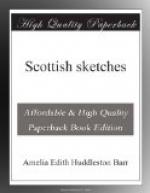One night at the close of the year, David did not come home to dinner, and John and the children ate it alone. He was very anxious, and he had not much heart to talk; but he kept the two eldest with him until little Flora’s head dropped, heavy with sleep, on his breast. Then a sudden thought seemed to strike him, and he sent them, almost hurriedly, away. He had scarcely done so when there was a shuffling noise in the hall, the parlor-door was flung open with a jar, and David staggered towards him—drunk!
In a moment, John’s natural temper conquered him; he jumped to his feet, and said passionately, “How daur ye, sir? Get out o’ my house, you sinfu’ lad!” Then, with a great cry he smote his hands together and bowed his head upon them, weeping slow, heavy drops, that came each with a separate pang. His agony touched David, though he scarcely comprehended it. Not all at once is the tender conscience seared, and the tender heart hardened.
“Uncle,” he said in a maudlin, hesitating way, which it would be a sin to imitate—“Uncle John, I’m not drunk, I’m in trouble; I’m in trouble, Uncle John. Don’t cry about me. I’m not worth it.”
Then he sank down upon the sofa, and, after a few more incoherent apologies, dropped into a deep sleep.
CHAPTER V.
John sat and looked at his fallen idol with a vacant, tear-stained face. He tried to pray a few words at intervals, but he was not yet able to gird up his soul and wrestle with this grief. When Jenny came in she was shocked at the gray, wretched look with which her master pointed to the shameful figure on the sofa. Nevertheless, she went gently to it, raised the fallen head to the pillow, and then went and got a blanket to cover the sleeper, muttering,
“Poor fellow! There’s nae need to let him get a pleurisy, ony gate. Whatna for did ye no tell me, deacon? Then I could hae made him a cup o’ warm tea.”
She spoke as if she was angry, not at David, but at John; and, though it was only the natural instinct of a woman defending what she dearly loved, John gave it a different meaning, and it added to his suffering.
“You are right, Jenny, woman,” he said humbly, “it is my fault. I mixed his first glass for him.”
“Vera weel. Somebody aye mixes the first glass. Somebody mixed your first glass. That is a bygane, and there is nae use at a’ speiring after it. How is the lad to be saved? That is the question now.”
“O Jenny, then you dare to hope for his salvation?”
“I would think it far mair sinfu’ to despair o’ it. The Father has twa kinds o’ sons, deacon. Ye are ane like the elder brother; ye hae ’served him many years and transgressed not at any time his commandment;’ but this dear lad is his younger son—still his son, mind ye—and he’ll win hame again to his Father’s house. What for not? He’s the bairn o’ many prayers. Gae awa to your ain room, deacon; I’ll keep the watch wi’ him. He’d rather see me nor you when he comes to himsel’.”




